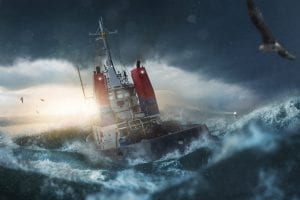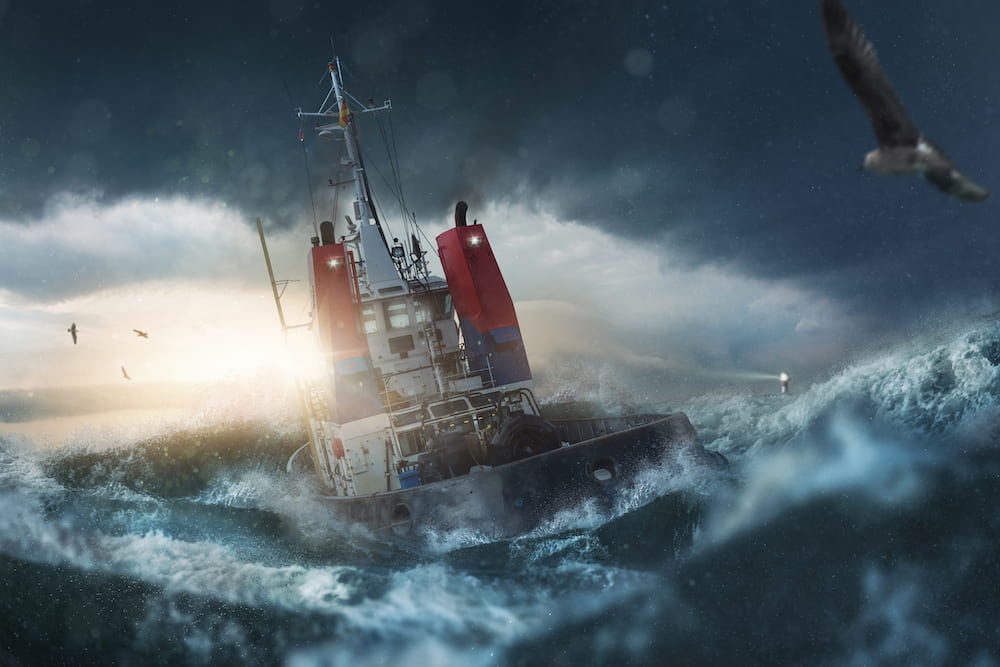written by Matt Andrews

Governments are most important in times of public crisis. This is where individuals—no matter how talented or self-reliant—look to their governments for help; to empower or use or deploy the powers and potentialities of the collective on behalf of that collective.
But many people tasked with leading public organizations in times of crises, struggle to know if and how to rise to the occasion. They know that people are looking to them for a lot, but wonder if they and their organizations are ready and/or capable to handle the many tasks.
This is a particular challenge in governments that have low capability or are in the process of trying to build capability. Crises involve threats that can easily overwhelm state capability, especially where such capability is limited to start with.
Leaders in such situations can easily feel like captains on small boats facing high winds and big waves. I have recently been in touch with a few such leaders, asking something like the following: “How do I help my people navigate and survive through high winds and big waves in our little boat? What kind of leadership is required to do this navigation?”
I plan to use this series of blog posts to offer ideas for leaders asking this question; on the subject of public leadership in and through crisis.
I write at a time when the Covid-19 crisis is peaking in some countries but only just hitting many countries where I typically work; especially in the developing world. I am not a public health specialist, and cannot therefore offer ideas on WHAT your policy response should be in the face of this crisis. But I do a lot of work on HOW you might organize your response—communicating, coordination, structuring the process, and managing yourself. That’s what I will focus on.
I am going to write the posts in simple language, keeping each one short with clear ideas and citations I find useful (for further reference). I will offer a maximum of four ideas in each blog post for easy consumption and leave it up to readers to create the space for additional learning by offering their own comments and observations. In most cases, I will present the ideas as questions for you to reflect on, rather than answers, so as to create space for honest, contextual reflection.
Let me start with some thoughts on how YOU, a public leader, might think of yourself as you face a crisis. I will use a short video interview with a colleague at the Harvard Business School, Nancy Koehn, discussing (in 2017) her then-new book “Forged in Crisis: The Power of Courageous Leadership in Turbulent Times” about five people who triumphed after facing what seemed to be insurmountable obstacles. The clip is about ten minutes. It’s worth watching from start to finish. I have some questions afterwards. Try and reflect on them, and your current situation, and what you feel as you and your people face whatever crisis you are in.
- Koehn speaks of the importance of a ‘worthy mission’ or ‘mission of decency’ driving the people through crisis.
- Do you agree that a ‘worthy’ personal mission is necessary to drive leaders in crisis?
- What is your ‘worthy’ ‘mission of decency’ in your crisis?
- Why are you in this leadership position and why do you care to make a difference?
- Koehn says we need leaders whose hearts have been touched by the fire of working for the public interest; Where the “I” gives way to the “Thou” and the person in position of leadership realizes that their job is about serving others (not themselves).
- Do you agree that a public interest is key for public leadership in times of crisis?
- What interests do you have in your job that are about ‘I’ (your career, political approval, and more)?
- What interests are now about ‘Thou’ (the public)?
- How can you cultivate a ‘fire’ to work more for the ‘Thou’ than the ‘I’?
- Koehn says that many leaders do not start with courage, but actually “had crippling moments of doubts…[often] when they were in the thick of [the crisis]…”. She says the key to their success was that they stepped back whenever they got to the chasm of doubt, which meant that even though they had doubt they never plunged into the chasm. ‘That’s what made all the difference’, she says.
- Do you agree that all leaders probably face doubts and fears when facing the responsibilities of leading their people in and through crisis?
- Can you relate to the idea of coming up to a ‘chasm of doubt’ in your own capabilities, or those of your administration, or even citizens? Do you have an example of this to share?
- What ideas do you have for ‘stepping back’ from the chasm of doubt? (you could relate to her message of Frederick Douglass ‘actively stepping into his fear’, for instance?)
- Koehn likes the definition of leadership by David Foster Wallace (late great English professor and author): “Real leaders are people who help us overcome the limitations of our own individual laziness and selfishness and weakness and fear and get us to do better, harder things than we can get ourselves to do on our own.”
- Do you think this is a relevant definition for leadership in a time of crisis? Why or why not?
- Who do you think you—in your leadership role—need to help to ‘do better, harder’ things in the face of this crisis?
One of the reasons I really like the interview with Koehn is that she is open about her own crises, and the lessons she learned through such. I trust that everyone reading this blog will be able to sail through whatever their situation is with similar lessons to the ones she shares, about herself:
“I’m stronger than I know … I’m too easily frightened … and I spend too much time asking why this has happened … you learn that being a victim, getting brittle, and being defined by a crisis doesn’t serve you and doesn’t move the boulder of goodness forward in any way”
The Public Leadership Through Crisis blog series offers ideas for leaders questioning how they can help and what kind of leadership is required in the face of a crisis (like the COVID-19 pandemic).
